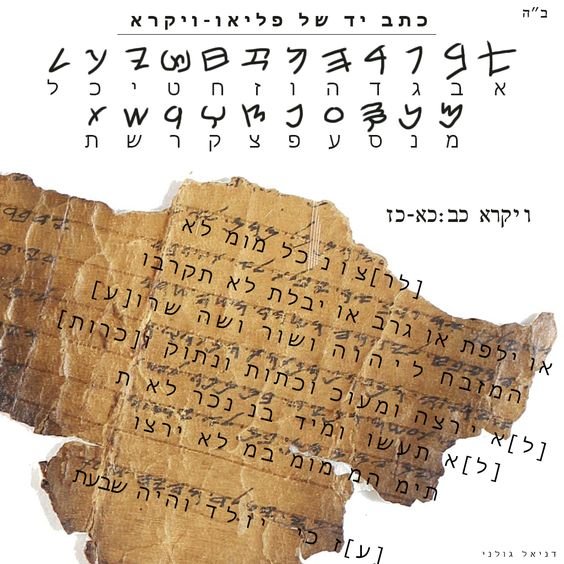HEBREW : A Semitic language of the Northern Central group

The Hebrew language is one of the oldest languages in existence, with a rich and varied history. In this article, we will explore the origins and development of the Hebrew language over time.
ORIGINS:
Hebrew Language is a Semitic language of the Northern Central group, originally adopted by the ‘ibhri, or Israelites, when they took possession of the land of Canaan west of the Jordan River in Palestine. The language has also been called the speech of Canaan, and Judean, after the kingdom of Judah. It is closely related to Phoenician and Moabite, with which it is often placed by scholars in a Canaanite subgroup.
The earliest known form of written Hebrew dates back to around 1000 BCE. It was used mainly by ancient Israelites who spoke it as their native tongue. Over time, other cultures such as Babylonians and Assyrians began using it for religious purposes. This eventually led to its spread throughout Europe during medieval times when Jews were expelled from Spain in 1492 CE.

HISTORY:
The Hebrew language has a long and rich history that dates back to ancient times. It is a Semitic language that was spoken by the Jewish people, and it has played a significant role in Jewish culture and religion. Hebrew was originally written using a script called Paleo-Hebrew, which was later replaced by the Aramaic script. In the 5th century BCE, Hebrew was revived as a written language, and it became the language of the Jewish scriptures. Some of the guttural consonants of Biblical Hebrew were combined or confused with one another, and many nouns were borrowed from Aramaic. Hebrew also borrowed a number of Greek, Latin, and Persian words. And over time, Hebrew evolved and changed, as it was influenced by these other languages such as Aramaic, Greek, and Yiddish. Today, Hebrew is the official language of Israel, and it is spoken by millions of people around the world.

DEVELOPMENT:
Throughout its long history, the Hebrew language has undergone many changes due to external influences from different cultures that have interacted with it over time. For example, Aramaic words were added after contact between Jewish people and those living in Mesopotamia during biblical times; Arabic loanwords entered into use following Muslim rule in Palestine; Yiddish borrowings came about through interaction between Ashkenazi Jews and Germanic peoples; Modern Israeli Hebraicized English terms are also present today due to immigration from countries where English is spoken widely (e.g., USA). Having survived centuries of history, it was finally revived as a modern language over 150 years ago, and today is spoken in Israel and beyond. As the language of the bible, Hebrew continues to fascinate and interest people around the world.

FEATURES OF HEBREW LANGUAGE:
The language is written from right to left in a North Semitic script of 22 letters. Only consonants were written in the language’s earliest period, and some of those consonants were later employed to represent long vowels as well.
In the 7th century CE the Masoretes in Tiberias introduced into the writing system diacritical marks, which represented short vowels and other phonological information. The Hebrew alphabet is an abjad, a writing system that lets the reader supply the appropriate vowel. Hebrew has vowels but they mostly aren’t marked – you have to know how each word is pronounced. Pure Hebrew words are always based on a three-letter root word (sometimes four).

SIGNIFICANCE:
Hebrew language has great significance in Judaism and is not commonly associated with language in any other religion. There are several reasons for this. Firstly, the Hebrew scripture’s depiction of the world’s being called into being through divine utterance suggests that Hebrew is the very language of creation. Secondly, the presence in scripture of verbatim quotations of God further highlights the significance of Hebrew. Finally, since it is the language of sacred texts, Hebrew itself is often considered sacred and has been referred to as lashon ha-kodesh, the holy language. It was even thought to be the language of angels and God.

DECLINE OF HEBREW LANGUAGE:
One of the main reasons for the decline in Hebrew is the influence of other languages. With the rise of globalization, English has become the dominant language of business, science, and technology. As a result, many Israelis, particularly the younger generation, are becoming more proficient in English than in Hebrew. This has led to a decrease in the use of Hebrew in everyday life, and has made it more difficult for Hebrew to compete with English as a language of communication.
Another reason for the decline of Hebrew is the changing cultural values of Israeli society. Many Israelis are now more interested in Western culture than in their own cultural heritage. This has led to a decrease in the use of Hebrew in popular culture, such as music and movies. In addition, many Israelis now prefer to speak in English, even when they are with other Hebrew speakers. This has further contributed to the decline of Hebrew as a language of daily use.

Finally, there is a lack of emphasis on the importance of Hebrew in Israeli society. Many young Israelis are not taught Hebrew properly in school, and there is not enough emphasis on the importance of Hebrew in everyday life. This lack of emphasis has led to a decline in the use of Hebrew, and has made it more difficult for Hebrew to compete with other languages.
In conclusion, the Hebrew language is facing a decline in its use. This decline has been attributed to a number of factors, including the influence of other languages, changes in cultural values, and a lack of emphasis on the importance of Hebrew. To reverse this decline, it is important for Israelis to recognize the importance of Hebrew in their cultural heritage, and to work to promote the use of Hebrew in everyday life. Only then can Hebrew continue to thrive as a language and the cultural heritage of the Jewish people.

CONCLUSION:
In conclusion, the Hebrew language has an incredibly long history that spans thousands of years and multiple continents across both Asia and Europe. Its evolution reflects not only cultural exchange but also political events which shaped its development along various paths depending on location or era at any given point in time – making it truly unique among all world languages.


